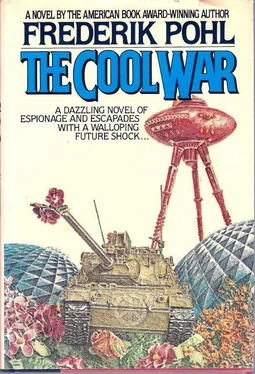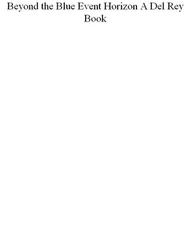The raft had no draft, and thus no consistency of purpose. Hake had no skill, and so entering the cave became a matter of brute force and persistence. On a negligible ledge near the cave two slim young men were sun-> ning their already dark bodies, and Hake’s flounderings took place under their amused and interested eyes. A powerful little hydrogen-outboard was bumping against its moorings just below them. Hake wished he could borrow the boat, but saw no way to accomplish it. In any event, he was committed. The rock ledges of the low cave entrance looked seriously sharp. Avoiding puncture, Hake almost lost an oar. Reclaiming the oar, he misjudged a wave and crunched the side of his skull against the low roof of the cave. But then he was through… and suspended in space.
From the outside the Grotto had looked neither blue nor inviting, but inside it was incredible. The sun that beat through the tiny entrance came in by a submarine route. By the time it illuminated the interior of the cave all of the warm frequencies had been trapped underwater, and what glowed inside the Grotto was pure cerulean. More. The light was all below the surface. Oil slicks marked the interface between air and water, but where there was no oil there seemed to be nothing below the level of Hake’s boat: he was floating in blue space, topsy-turvy, disoriented— and enchanted.
He was also alone.
That was not a surprise in itself; it was far too early for the tour boats. But it was already past eight o’clock. Finding the boat and arguing with its owner had taken longer than it should, and where was Leota?
A string of bubbles coming in from the cave mouth answered him. Under them was a wavery pale shape that could have been a large fish, began to resemble a mermaid and then became Leota, air tanks strapped to her back and breathing gear over her face. She moved upward through the bright water and surfaced a few yards away. She pulled the face mask off and hung there for a moment, regarding him, then swam to clutch the end of the raft. “Hello, Hake,” she panted, her voice tiny in the huge wet space.
Hake looked down at her, almost embarrassed. Apart from the straps for the air tanks, the woman was wearing very little— la minima, it was called—a brightly colored triangular scrap of cloth below her navel, held by thin cords, and nothing above. “Get in, for God’s sake,” he said.
“I’ll get you all wet and oily.”
“Get in, get in!” He leaned to starboard while she climbed in from port, and they managed to get her aboard without tipping over. They regarded each other silently for a moment before he demanded, “What are you doing in Italy?”
She threw her hair back and wiped oil from her face. “Better things than you are, at least. I never thought you’d be pushing drugs.”
“Drugs?” But even as he spoke, he knew he did not doubt her.
“That’s right, Hake. That’s what your bunch is up to. I’m willing to believe,” she conceded, “that you didn’t know it, because I don’t think it’s your style at’all. But there it is.” She turned to study the empty cave entrance for a moment. “I have ten minutes, no more,” she added. “Then you stay here for a while and I’ll go. Don’t try to follow me, Hake. I have friends—”
“Oh, for God’s sake. Look, first things first. Are you sure about the drugs?”
“Bloody damn sure,” she said. “The Italian cops put one of your boys away for it yesterday. Stopped him in that galleria in Naples, with a satchel full of Xeroxed directions for making angel dust.”
“I never heard of angel dust!”
“What they call pay-chay-pay. PCP. It’s an old drug, comes back every twenty years or so—when a new generation comes along that doesn’t know what it can do to you. One or two shots can screw up your head forever. Thing is, it’s the easiest thing in the world to make. Any high-school kid can put it together in Mom’s kitchen if he has the directions. Your boy was selling the recipe to all the ragazzi in Naples—until one of them finked to the fuzz.”
They were drifting close to the wall of the cave. Awkwardly Hake sculled them a few yards farther away, while Leota watched with amusement. He said doggedly, “I don’t want to call you a liar, but I didn’t think the, uh, the group I’m involved with would do anything like that. How do you know this person worked for us?”
“Oh, I know. Who do you think alerted the Italian narcs to plant the kid in the galleria? You want the details?” She leaned back against her air tanks and recited: “Dietrich Nederkoorn, comes from a little fishing village in Holland, deserted the Dutch Army three years ago, worked for your boys ever since at one crummy thing or another. About twenty-five. Gay. Beatle haircut. Blue eyes, black hair, freckles, medium height.”
“Yeah,” Hake said slowly. “I saw him in Germany. But why would we do a thing like that?”
“What I’ve been asking you all along, Hake. I don’t mean why they would. I mean why you would. For the gorillas you work for, sure, it’s tailor-made. Very cost-effective. It’s like a bite of the apple from the Tree of the Knowledge of Good and Evil. Once you get it started, it runs itself. By now there must be a million of those circulars in Italy. If Nederkoorn weren’t such an asshole he wouldn’t be in the slammer now. The process was already on the way. There’s no way in the world the Italian narcs, or anybody else, can catch up with all those leaflets and all the copies that are being made. So there goes a whole generation of Italian kids. Thousands of them, maybe millions, are going to be showing up for work stoned out of their heads from something they scored two weeks back—• if they show up at all. It’s a big success, Hake. The government’s got an all-out drive against it right now, school assembly programs, TV commercials, rock stars traveling the country to campaign against it—for all the good that’s going to do,” she said bitterly. “What kind of human being does a thing like that?”
“I wish I could tell you,” Hake said unhappily. Well, part of it he could have told her. The obsession that caused Mario and the others to practice their petty harassments with fuse-blowers and tiny floods was enough to explain Dieter’s being unable to stop. But— “But I don’t know what I’m doing in this,” he said. “All I’ve done is sit around.”
She stared at him. “You didn’t know? Oh, Christ, Hake. The reason they brought you over here was to put the finger on me.”
“I never said a word!”
“No, Hake,” she said, with no anger in her tone, “I’m sure you didn’t. I wouldn’t be here if I weren’t. You’re dumb, yes. But not treacherous. You didn’t have to. Your tickle-taster took care of it for you.”
“What the hell’s a tickle-taster?”
“You’re wearing it right now, Hake.” She pointed to his silver wristlet. “Works sort of like a polygraph; it monitors your pulse and blood levels. All they had to do was wait until you went boing on the taster, and then see who caused it. Which was me. I knew they were close. They could figure I had to be working at one of three or four places on Capri, and all they had to do was plant you in them one after another until I turned up. Oh, Hake,” she said, actually smiling, “don’t look so guilty\ They would’ve got to me sooner or later.”
Hake stared at the judas on his arm, shining cold blue in the diffuse light. “I’m sorry,” he said.
“Yeah. Well. Listen, there’s not much they can do to me. I’m on Italian territory. I haven’t done anything against the law here, or anyway not much. Besides, I helped the Italians find Nederkoorn.”
Hake said, “I think the way I was looking wasn’t so much guilty as just plain foolish. What will you do now?”
Читать дальше












